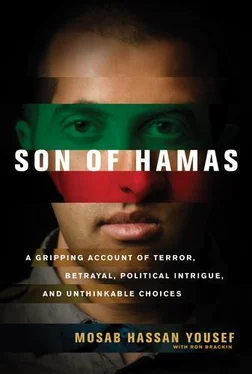Egypt, Lebanon, Syria, Jordan, and Iraq immediately invaded the new Jewish state. Among the ten thousand Egyptian troops were thousands of Muslim Brotherhood volunteers. The Arab coalition, however, was outnumbered and outgunned. Less than a year later, the Arab troops had been driven out.
As a result of the war, about three-quarters of a million Palestinian Arabs fled or were expelled from their homes in the territories that became the State of Israel.
Although the United Nations passed Resolution 194, which stated in part that “refugees wishing to return to their homes and live at peace with their neighbours should be permitted to do so” and that “compensation should be paid for the property of those choosing not to return,” this recommendation was never implemented. Tens of thousands of Palestinians who fled Israel during the Arab-Israeli War never regained their homes and land. Many of these refugees and their descendants live in squalid refugee camps operated by the United Nations (UN) to this day.
When the now-armed members of the Muslim Brotherhood returned from the battlefield to Egypt, the suspended coup was on again. But news of the overthrow plan leaked out, and the Egyptian government banned the Brotherhood, confiscated its assets, and imprisoned many of its members. Those who escaped arrest assassinated Egypt’s prime minister a few weeks later.
Hassan al-Banna, in turn, was assassinated on February 12, 1949, presumably by the government secret service. But the Brotherhood was not crushed. In just twenty years, Hassan al-Banna had shaken Islam out of its dormancy and created a revolution with armed fighters. And for the next few years, the organization continued to add to its numbers and its influence among the people, not only in Egypt but also in nearby Syria and Jordan.
By the time my father arrived in Jordan in the mid-1970s to continue his studies, the Muslim Brotherhood there was well established and beloved by the people. Its members were doing everything that was on my father’s heart—encouraging renewed faith among those who had strayed from the Islamic way of life, healing those who were hurt, and trying to save people from the corrupting influences in society. He believed these men were religious reformers to Islam, as Martin Luther and William Tyndale were to Christianity. They only wanted to save people and improve their lives, not to kill and destroy. And when my father met some of the early leaders of the Brotherhood, he said, “Yes, this is what I have been looking for.”
What my father saw in those early days was the part of Islam that reflects love and mercy. What he didn’t see, what he perhaps has never yet allowed himself to see, is the other side of Islam.
Islamic life is like a ladder, with prayer and praising Allah as the bottom rung. The higher rungs represent helping the poor and needy, establishing schools, and supporting charities. The highest rung is jihad.
The ladder is tall. Few look up to see what is at the top. And progress is usually gradual, almost imperceptible—like a barn cat stalking a swallow. The swallow never takes its eyes off the cat. It just stands there, watching the cat pace back and forth, back and forth. But the swallow does not judge depth. It does not see that the cat is getting a little bit closer with every pass until, in the blink of an eye, the cat’s claws are stained with the swallow’s blood.
Traditional Muslims stand at the foot of the ladder, living in guilt for not really practicing Islam. At the top are fundamentalists, the ones you see in the news killing women and children for the glory of the god of the Qur’an. Moderates are somewhere in between.
A moderate Muslim is actually more dangerous than a fundamentalist, however, because he appears to be harmless, and you can never tell when he has taken that next step toward the top. Most suicide bombers began as moderates.
The day my father first put his foot on the bottom rung of the ladder, he could never have imagined how far from his original ideals he would eventually climb. And thirty-five years later, I would want to ask him: Do you remember where you started? You saw all those lost people, your heart broke for them, and you wanted them to come to Allah and be safe. Now suicide bombers and innocent blood? Is this what you set out to do? But speaking to one’s father about such things is not done in our culture. And so he continued on that dangerous path.
Chapter Three
MUSLIM BROTHERHOOD
1977–1987
When my father returned to the occupied territories after his studies in Jordan, he was filled with optimism and hope for Muslims everywhere. In his mind he saw a bright future brought about by a moderate manifestation of the Muslim Brotherhood.
Accompanying him was Ibrahim Abu Salem, one of the founders of the Muslim Brotherhood in Jordan. Abu Salem had come to help breathe life into the stagnated Brotherhood in Palestine. He and my father worked well together, recruiting young people who shared their passion and forming them into small activist groups.
In 1977, with only fifty dinars in his pocket, Hassan married Ibrahim Abu Salem’s sister Sabha Abu Salem. I was born the following year.
When I was seven years old, our family moved to Al-Bireh, the twin city of Ramallah, and my father became imam of Al-Amari refugee camp, which was established within Al-Bireh’s municipal borders. Nineteen camps dotted the West Bank, and Al-Amari had been established in 1949 on about twenty-two acres. By 1957, its weathered tents had been replaced by wall-to-wall, back-to-back concrete houses. Streets were the width of a car, their gutters flowing with raw sewage like rivers of sludge. The camp was overcrowded; the water, undrinkable. One lone tree stood at the center of the camp. The refugees depended on the United Nations for everything—housing, food, clothing, medical care, and education.
When my father went to the mosque for the first time, he was disappointed to find only two rows of people praying, with twenty men in each row. Several months after he began to preach in the camp, however, people filled the mosque and overflowed into the streets. In addition to his devotion to Allah, my father had a great love and compassion for the Muslim people. And in return, they, too, grew to love him very much.
Hassan Yousef was so likable because he was just like everyone else. He did not think of himself as higher than those he served. He lived as they lived, ate what they ate, prayed like they prayed. He didn’t wear fancy clothes. He drew a small salary from the Jordanian government—barely enough to cover his expenses—which supported the operation and maintenance of religious sites. His official day off was Monday, but he never took it. He didn’t work for wages; he worked to please Allah. For him, this was his holy duty, his life’s purpose.
In September 1987, my father took a second job teaching religion to the Muslim students who attended a private Christian school in the West Bank. Of course, that meant we saw less of him than before—not because he didn’t love his family but because he loved Allah more. What we didn’t realize, however, was that a time was coming in the days ahead when we would hardly see him at all.
While my father worked, my mother carried the burden of raising the children alone. She taught us how to be good Muslims, waking us for dawn prayer when we were old enough and encouraging us to fast during the Islamic holy month of Ramadan. There were now six of us—my brothers Sohayb, Seif, and Oways; my sisters Sabeela and Tasneem; and myself. Even with my father’s income from two jobs, we barely had enough money to pay the bills. My mother worked hard to stretch every dinar until it snapped.
Sabeela and Tasneem started helping my mother with the chores when they were very young. Sweet and pure and beautiful, my sisters never complained, even though their toys were covered with dust because they didn’t have time to play with them. Instead, their new toys were kitchen utensils.
Читать дальше












